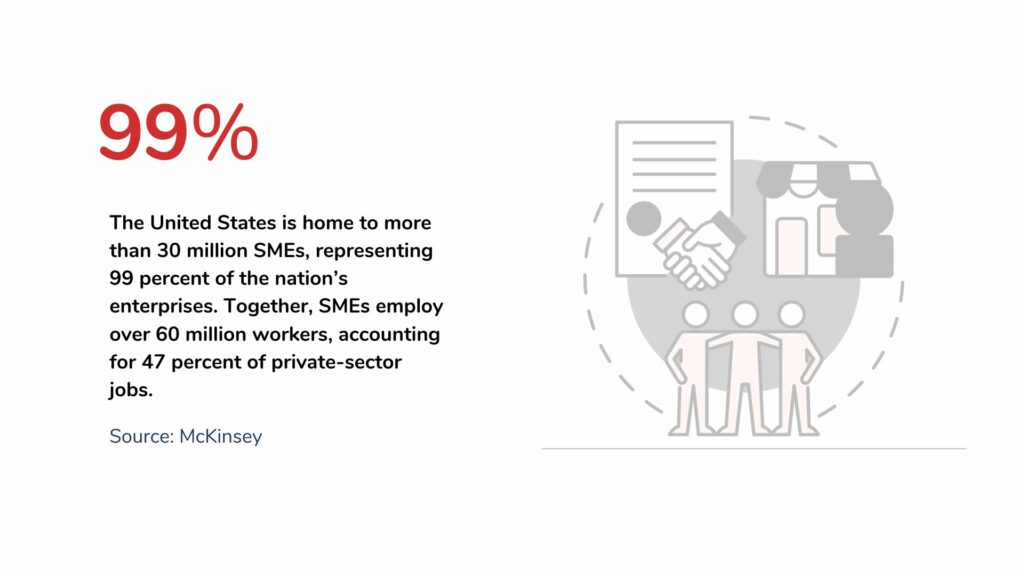Small and Medium Businesses (SMBs) are the most important part of most economies, particularly developing countries. Retail SMBs constitute the majority of businesses worldwide, making substantial contributions to job creation and global economic development.
SMBs are a crucial client segment for banks, presenting a key opportunity to enhance their revenues, especially during rising interest rates and industry turbulence when depositors may consider relocating their funds.
The financial potential is substantial, particularly in the United States, where over 30 million small businesses comprise 99% of the nation’s enterprises. They employ over 60 million workers, contributing to 47% of private-sector jobs. Small-business banking generates approximately $150 billion in annual revenue for the US banking industry across various products, including deposits, loans, cards, cash management, and merchant services. However, a recent report indicates that almost 34% of SMBs do not utilize credit but express the desire to do so, highlighting a potential gap in credit accessibility for these businesses.

Key Takeaways
- Challenges in External Financing: SMBs need help securing external financing, hindering their ability to achieve established objectives. Despite being a crucial client segment for banks, a significant portion (34%) of SMBs express the desire for credit but face barriers, emphasizing the need for improved financial support mechanisms.
- Diverse Reasons for Lack of Financial Resources: The lack of credit access compels SMBs to seek alternative funding, with 8% relying solely on personal financing and others turning to friends and family. Common barriers include difficulties meeting collateral demands, inadequate financial documentation, limited investor awareness, and challenges navigating complex regulatory frameworks.
- Risk of Closure and Urgent Need for Solutions: SMBs relying on personal savings and limited cash face closure risks, particularly in the retail sector. This highlights the urgent need for comprehensive financial solutions to address challenges such as insufficient funding, cash flow issues, and slowed sales expansion.
- Rise of Corporate Credit Cards as a Strategic Tool: SMBs increasingly turn to innovative fintechs and financial platforms when facing limitations with traditional banks. Corporate credit cards have emerged as a popular choice, offering advantages such as interest-free access to working capital and flexibility in carrying a revolving balance. This shift underscores the crucial role of alternative financial solutions in supporting SMBs’ economic well-being and growth aspirations.
The Ongoing Struggles Faced by Retail SMBs in Securing External Financing

Raising capital is getting more challenging by the day for SMBs as they find external financing sources to fulfill their capital requirements. One-third of the SMBs need help to find their footing while securing. These hurdles restrict their efforts and create a significant barrier to realizing the business’s established objectives. In the ever-changing retail market, where capital serves as the lifeblood for expansion, banks actively seek ways to support small businesses by offering new products and services.
Nevertheless, as of July of last year, just 47% of SMBs with yearly earnings of $10 million or fewer had the option of personal or business loan options. Different industries have different levels of financing access; 41% of small businesses have access to financing.
SMBs’ Struggle Due To Lack Of Financial Resources
The absence of credit access places SMBs in a challenging position, compelling them to seek alternative funding sources. Recent studies reveal around 8% of SMBs rely solely on personal financing, while many turn to friends and family for loans. This reliance intensified for businesses launched in March 2020, worsening challenges such as insufficient funding, cash flow issues, slowed sales expansion, and ineffective hiring—a profound impact amid the great resignation. Other common reasons why businesses are unable to secure funding are:
- Lack of Collateral:
Small businesses frequently encounter challenges meeting the collateral demands of traditional lenders. These financial institutions often necessitate tangible assets as collateral, posing a barrier for many SMBs that may need such assets. This limitation curtails their ability to secure loans based on conventional lending criteria.
- Inadequate Financial Documentation:
SMBs often need help furnishing comprehensive financial documentation and statements that align with lenders’ requirements. The absence of financial records, audited statements, or reliable financial projections can impede their capacity to secure financing.
- Limited Investor Awareness:
Attracting the attention of potential investors proves to be a struggle for SMBs. Venture capitalists, angel investors, and other investment firms may predominantly focus on more significant deals or possess limited knowledge about the opportunities presented by SMBs. This lack of awareness creates challenges for SMBs in finding suitable investors.
- Regulatory Constraints:
SMBs frequently grapple with navigating intricate and evolving regulatory frameworks. Ensuring compliance with laws and regulations related to taxation, employment, health and safety, data protection, and environmental standards poses challenges, especially for smaller businesses with limited expertise or dedicated compliance departments.
SMBs relying on personal savings face a precarious situation as these resources deplete over time. Additionally, funds from friends and family may need to be improved to sustain daily operations, leading to a concerning trend. Approximately 8.6% of retail SMBs face closure risks, with retailers even at the higher risk of about 19% with access to less than $5,000 in cash. This underscores the urgent need for comprehensive financial solutions to support SMBs in steering through these critical challenges.
The Rise Of Corporate Credit Cards As A Strategic Tool

The limitations of traditional banks have paved the way for innovative fintechs and financial platforms open to extending favorable services to SMBs and their economic challenges. SMBs increasingly turn to external financing to overcome these hurdles, recognizing it as a pivotal strategy to avert closures and foster growth. And most SMBs plan to boost their workflow with their credit products to meet their diverse business needs.
Among the preferred options for financing, corporate credit cards emerge as a popular choice for SMBs. Leveraging corporate credit cards as a form of working capital offers numerous advantages. For instance, businesses utilizing these cards for supplier payments or services enjoy interest-free access to operating capital, with payments deferred by 30 to 60 days. Additionally, the flexibility to carry a revolving balance becomes invaluable during periods of tight cash flows. This shift in financial strategies underscores the evolving landscape where alternative financial solutions are pivotal in supporting SMBs’ economic well-being and growth aspirations.
Conclusion
Small and Medium Businesses (SMBs) encounter diverse obstacles when securing funding. These challenges range from limited access to bank loans to difficulties such as insufficient collateral, financial documentation, lack of awareness, and regulatory constraints. The unavailability of credit options compels SMBs to explore funding sources, often relying on financing or loans from friends and family. Unfortunately, this reliance puts a percentage of SMBs at risk of closure.
Acknowledging these difficulties, other funding resources like corporate credit cards have emerged as a tool for SMBs, providing them an interest-free way to access working capital. As traditional banks face limitations in meeting their needs, innovative fintech companies and financial platforms have stepped in to offer solutions that support SMBs in navigating uncertainties and fostering growth. Financial tools have become crucial for SMBs seeking sustainable economic well-being and striving to achieve their growth goals.

